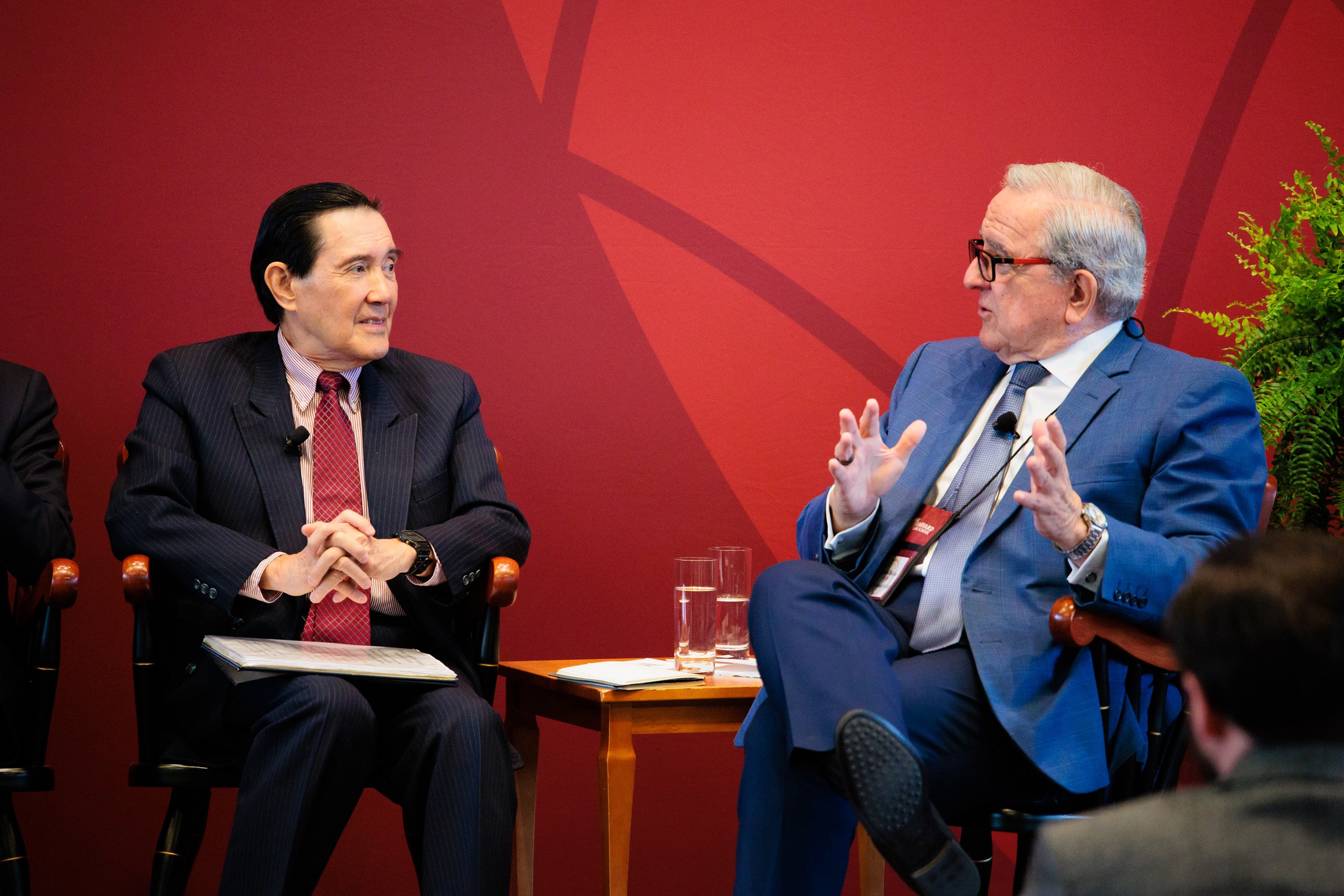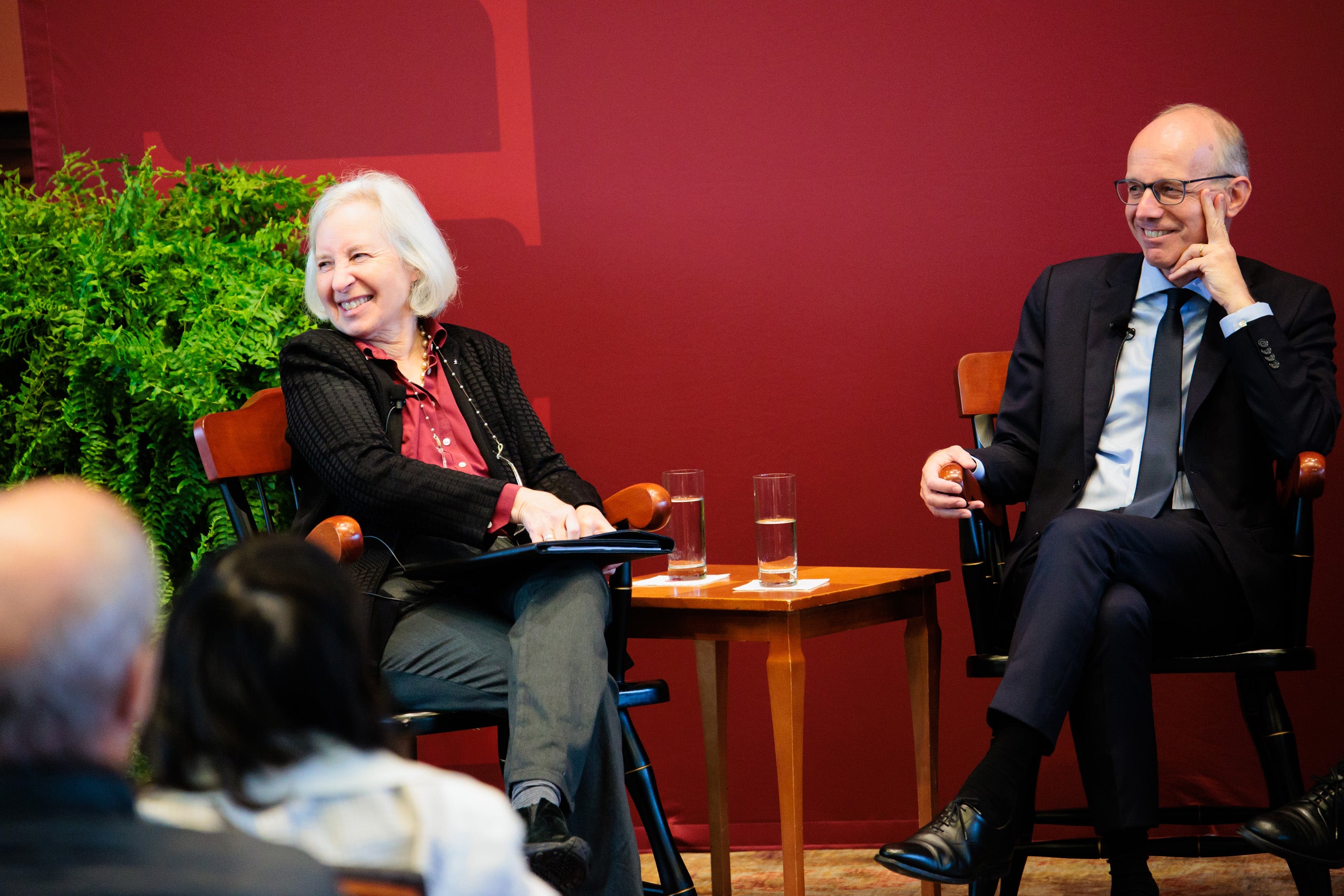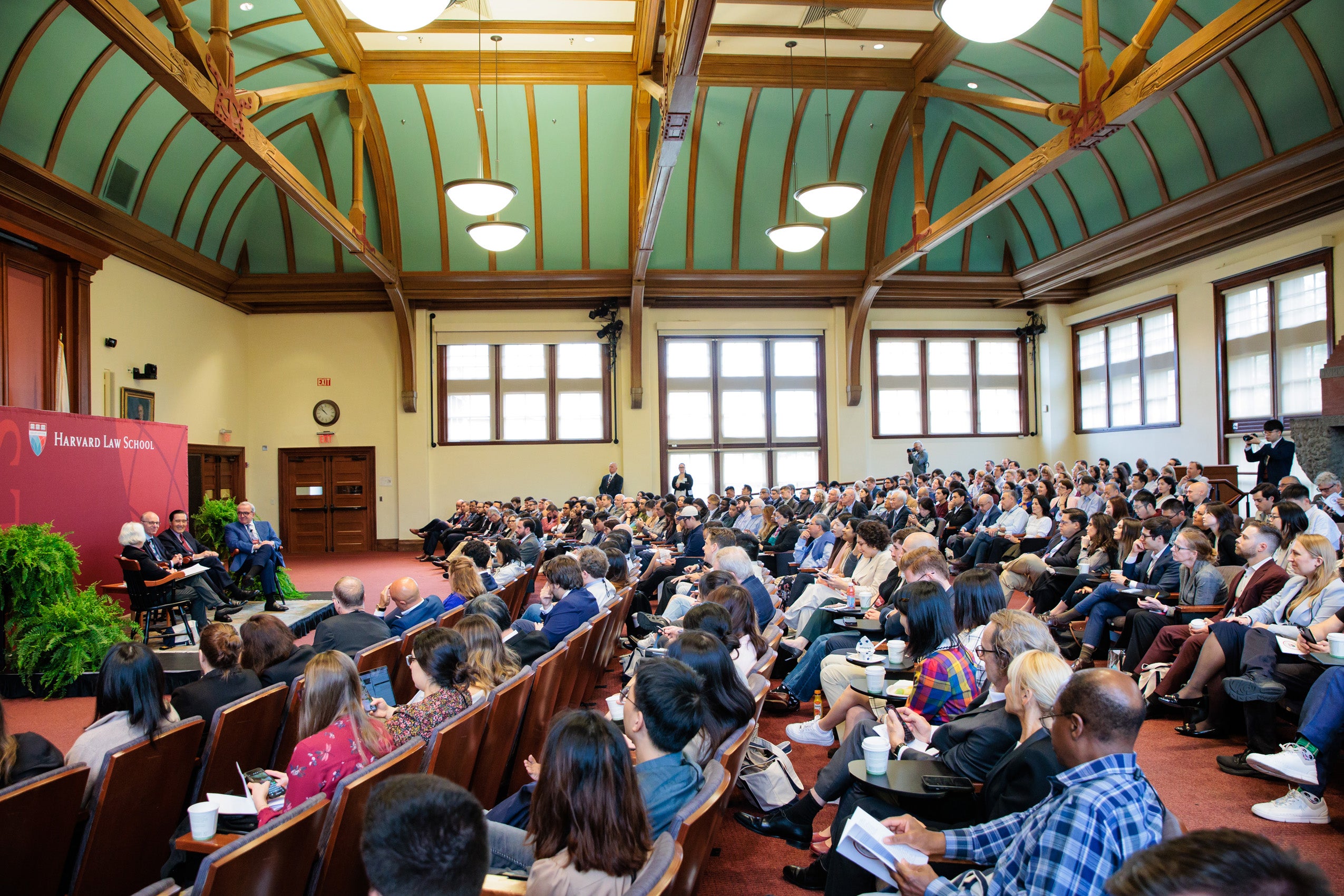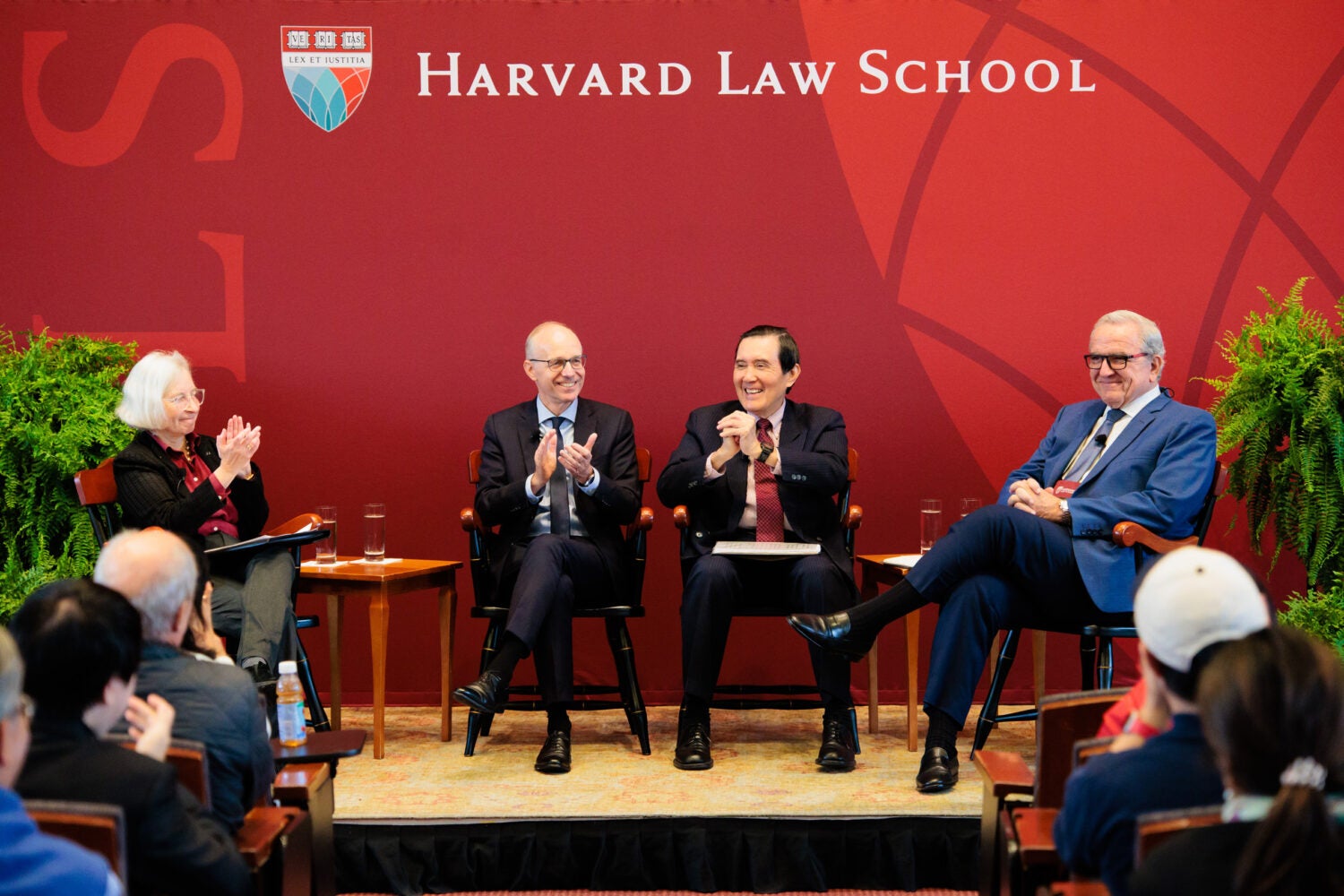As he wrapped up his studies, he used his early negotiating skills to bargain over the price of a bike in early 1980s Cambridge, joked Ma Ying-jeou S.J.D. ’81, former president of the Republic of China, also known as Taiwan. But those talents, honed at Harvard while he was pursuing his Master of Laws degree (LL.M.), would later prove invaluable during his career in higher office.
Ma told a crowd gathered in Austin Hall Saturday for the 100th anniversary of the Harvard Law School LL.M. program that his training in the art of diplomatic compromise and in international law, two of the many things he took from his Harvard time, were critical during his presidency in 2013, when he was negotiating access to the waters surrounding a series of islands not far from Japan and Taiwan.
Ma was instrumental in helping gain approval for the landmark agreement securing each country’s access to fishing rights in their overlapping territories that encircle the archipelago. “That was one of the most important accomplishments during my term as president,” said Ma, adding that finding peaceful resolutions to international disputes was a top priority during his tenure and continue to be for the island’s current leaders, especially given the nature of relations with mainland China, which considers Taiwan a breakaway province. “So far we have been able to achieve a lot in our relations with mainland China,” through basically friendly means, said Ma, noting that while leaders in Beijing are eager to use peaceful negotiations to settle disputes with Taiwan “they will not exclude the use of force.”
Ma took the stage with Roberto Dañino LL.M. ’75, former prime minister of Perú, and Luc Frieden LL.M. ’88, prime minister of Luxembourg, for a wide-reaching discussion moderated by Martha Minow, Harvard’s 300th Anniversary University Professor. Their conversation touched on a range of topics, including their time at Harvard Law School, their careers in government, and their advice for future leaders.

The event was part of a two-day centennial celebration held on campus on Sept. 27-28 in honor of the LL.M. program, a one-year curriculum designed for students from around the globe who’ve already received their first law degrees and who are seeking to increase their knowledge.
Austin Hall’s Ames Courtroom was filled on Sept. 28 with current and past students eager to hear from the three alumni, all of whom said their Harvard experience made a profound impact on their lives, in large part by exposing them to classmates from different parts of the world who challenged them to think differently.
Frieden praised the global nature of the program’s student body and the diversity of perspectives it engendered. At Harvard, he learned how the same issue might be seen entirely differently, he said, depending on where you were from. Those lessons came in handy recently when visiting with Hungarian Prime Minister Viktor Orbán. “The mere fact of talking to him, of trying to understand where he is coming from, also disagreeing with him, and I strongly disagree with him on some of the fundamental values that he expresses,” said Frieden, can help make the world better. “That is also something we are taught here.”

Dañino said Harvard changed his life by opening up a window on the world. “In that process of learning about the world, really, I learned how to deal with adversaries,” he said, “how to respect the opinions of others, how to be kind even when you have the strongest disagreements.”
Frieden also echoed Ma’s and Dañino’s praise for Harvard’s teachings on the art of negotiation, noting that he relied on the skills he took from the classroom when forming a coalition government last year that involved navigating the competing interests of those focused on sovereignty and those prioritizing national security. He uses the same tools he said in almost every conflict he is dealing with. “I really do feel that it was what I [was] taught here that taught me how to govern today.”
For anyone in the public eye, criticism comes with the job, said Minow, who asked the panelists how they have managed to deal with less than flattering feedback throughout their careers. Dañino urged his listeners to both develop a “thick skin,” and to distinguish between valid suggestions and capricious fault-finding. If you can’t tell the difference between an attack and fair criticism, he warned, you will spend “80 percent of your time defending yourself as opposed to doing things.”
Ma said he learned to cope with critiques in part through careful listening. The former Taiwanese president took a novel approach while campaigning, visiting roughly 100 homes across the island, he said, staying, eating, and working with local residents. That personal connection helped him learn from his constituents and offered them direct insight into his ideas and agenda. It gives them a sense of “who you are,” Ma said, “and what you will do when you become president.”
For Frieden, Harvard also taught him about giving back.
“From those to whom a lot has been given, a lot will be required” said the European politician, recalling a Harvard graduation speaker’s Bible quote. “We are fortunate, so we have to serve our communities,” Frieden said, urging those present to recognize that the privilege of attending a place like Harvard comes with a responsibility to give back.
When offering advice to current and former LL.M. students, Dañino said that whether as the head of the World Bank or the head of a country, a key to being a good leader is effective communication. He emphasized the importance of reframing challenging narratives while he was working with lawyers at the World Bank by moving naysayers away from focusing on why something won’t work toward possible solutions. Go from “why not lawyers,” he said, “to how to lawyers.”

In responding to a question from the audience about the role of Africa in the world, Dañino warned of outside influence and the perception that China is playing a major role on the continent. “Africa should be self-assured, independent of all powers, and have its own purpose in the world and not become just a proxy for other powers,” he said. Frieden argued for more African representation on the global stage, calling it unacceptable that “Africa is not sitting around the table of the U.N. Security Council.”
Addressing the top challenges currently facing their countries, the panelists acknowledged that immigration, poverty, and the wars in Europe and the Middle East are urgent concerns, as is the rise of extremism and the ease with which social media can fan the flames of hate and spread falsehoods. Circling back to some of the lessons he took from Harvard, Frieden said democracy is strong “if we can accept different views … [and] react to those views” and that to make lasting change, instead of condemning a voter’s choices, leaders must understand why their constituents choose to vote the way they do.
Talking to voters, said Frieden, understanding their frustrations, offering them effective social policies, and convincing them that extremism isn’t the road to social cohesion “is our role as leaders.”
Want to stay up to date with Harvard Law Today? Sign up for our weekly newsletter.
